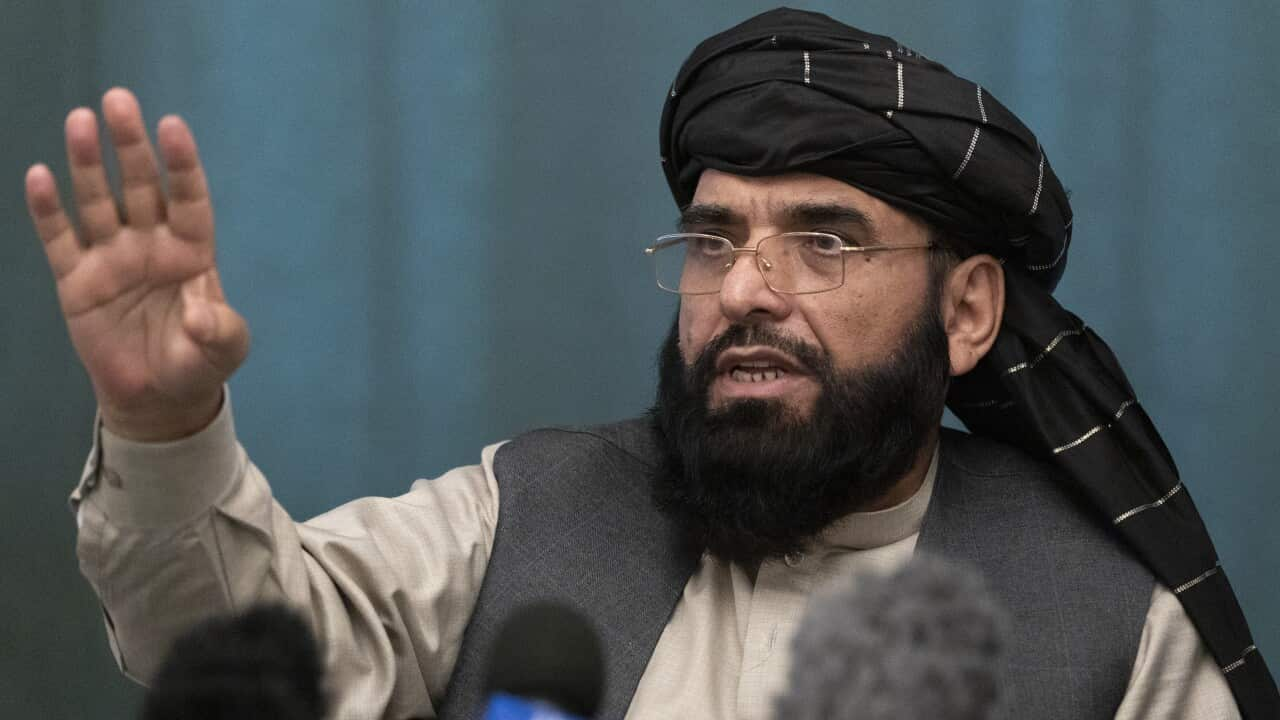Taliban spokesperson Suhail Shaheen says Afghanistan is in “dire need” of foreign assistance and claims the militant group will provide a “secure environment” to foreign nationals to facilitate it.
In a number of audio messages sent in response to questions from SBS Pashto, he says countries that were involved in the “occupation” of Afghanistan during the decades-long conflict had a “moral obligation” to rebuild the country.
“During the past 20 years, our country was occupied, and we were fighting for the liberation of our country. Now that this chapter is coming to an end, foreign forces are withdrawing completely from our country, there is a need for foreign construction in Afghanistan,” says Mr Shaheen, who was a member of the group's negotiating team during peace talks with the US.
“A new phase has started where all countries who were involved in the destruction of our country and occupation, have a moral obligation to also [be] involved in helping the people of Afghanistan have a dignified life and to help [in the] rebuilding of Afghanistan.”
The comments come as countries including Australia continue their efforts to evacuate citizens and Afghan locally engaged employees (LEEs), who assisted their forces during the conflict.
On Monday, Prime Minister Scott Morrison confirmed that more than 400 people were evacuated overnight, and said further flights were planned.
Some 300 people were evacuated the previous day, Mr Morrison confirmed, as Australian Defence Force troops patrol the tarmac at Hamid Karzai International Airport in Kabul. On Sunday,
On Sunday,

UK coalition forces, Turkish coalition forces, and US Marines assist a child during an evacuation at Hamid Karzai International Airport on 20 August 2021. Source: AAP
No further details were provided about the potential threat, but Mr Shaheen says the Taliban established checkpoints outside the complex to “check documents” amid the threat posed by IS fighters who “wanted to reach the airport under the cover of evacuation to carry out sabotage activities”. Going forward, Mr Shaheen says the Taliban wants “good relations” with all countries to raise employment prospects for Afghanis.
Going forward, Mr Shaheen says the Taliban wants “good relations” with all countries to raise employment prospects for Afghanis.

Taliban spokesman Suhail Shaheen was involved in the negotiations between the group and US. Source: AAP
“Right now, about 70 per cent of the people of Afghanistan are living under the line of poverty.
“Also, about foreign nationals, of course we provide a secure environment for their functioning, for their work in the country, in their embassies, and other NGO charity organisations that are working in Afghanistan.
“We want them to continue their work in the country because there is a dire need of the people of Afghanistan for their assistance.”
Afghanistan economy 'hanging off a cliff'
Mohib Iqbal, a development expert with extensive experience in Afghanistan, said following the takeover of Afghanistan, the Taliban is "eager for international recognition and financial assistance".
"This has been their consistent message since the start of the Doha peace process. They have met some of their commitments in this regard including no attacks on foreign forces in Afghanistan since the signing of the US-Taliban agreement.
"They are also willing to let the evacuation mission complete. In this context, I find the Taliban genuine in their promise to the international community. However, they have been way less consistent on their commitments to the Afghan people and the now collapsed Afghan government."
Mr Iqbal, who is currently advising on the World Bank development programs in the country, says Afghanistan's economy is "having off a cliff" and will experience a "sudden collapse if not rescued urgently".
"The Afghan currency is at risk of astronomical depreciation, which will paralyse all of the economic activity and leave millions unable to afford food. Both the International Monetary Fund and the US have blocked Afghanistan's US$7 billion strategic reserves, leaving the Taliban extremely vulnerable economically.
"Afghanistan was declared a humanitarian crisis before the current crisis with millions of people needing urgent food support to avoid hunger. After the collapse, markets are closed, government offices are dysfunctional and the Taliban have no budget to pay the salaries of the teachers, doctors, police and the government bureaucracy in general.
"A strong economic crisis is brewing as the media focuses on the evacuation and as the Taliban take their victory lap."
Mr Iqbal says the Taliban has a number of revenue sources including the "illicit economy" such as the narcotics trade and taxation of Afghanistan’s rural agriculture economy.
He believes this might "cushion" them from serious economic problems as a group, but these sources are "terribly insufficient for the country as a whole".
"The most urgent problem for the Taliban is if they can secure the international community’s support for Afghanistan, both [by] responding to the humanitarian crisis and support to the Afghan economy to salvage it from a sudden collapse.
"For this, they need all the Afghan reserves, but also strong international support and commitment, which will not be easy to secure."
SBS Pashto has contacted the Department of Foreign Affairs and Trade for comment.



